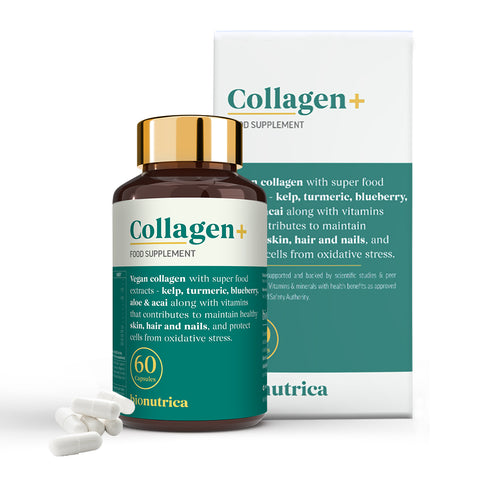Collagen is a powerhouse protein that serves as the building block for healthy skin, hair, nails, and joints. As we age, our natural collagen production declines, leading to signs of aging such as wrinkles, sagging skin, and joint stiffness. However, incorporating collagen into your daily routine can help replenish lost collagen and support overall health and wellness. In this guide, we'll delve into the benefits of collagen for skin health and overall vitality, as well as explore natural sources and supplements to consider.
Benefits of Collagen for Skin:
- Improves Skin Elasticity: Collagen helps maintain skin's elasticity, keeping it firm and reducing the appearance of wrinkles and fine lines.
- Enhances Hydration: Collagen supports skin hydration, making it look plump and youthful.
- Promotes Skin Regeneration: Collagen aids in skin cell renewal, leading to a smoother, more even complexion.
- Reduces Signs of Aging: By boosting collagen levels, you can diminish common signs of aging, such as wrinkles, dullness, and uneven skin tone.
Other Health Benefits of Collagen:
- Supports Joint Health: Collagen is a crucial component of cartilage, which cushions joints and helps maintain flexibility and mobility.
- Strengthens Hair and Nails: Collagen promotes the growth and strength of hair and nails, reducing brittleness and breakage.
- Aids Digestion: Collagen helps maintain a healthy digestive tract, supporting proper digestion and nutrient absorption.
Natural Sources of Collagen:
- Bone Broth: A nutrient-rich broth made from simmering animal bones and connective tissue, bone broth is a natural source of collagen and other essential nutrients.
- Gelatin: Derived from collagen, gelatin is a protein-rich substance that can be used in cooking and baking to support skin health.
- Fish: Fish collagen, sourced from the skin and scales of fish, is a bioavailable form of collagen that is easily absorbed by the body.
- Egg Whites: Egg whites contain collagen-boosting nutrients like proline and glycine, which support skin health.
- Citrus Fruits: Vitamin C-rich foods like oranges, lemons, and grapefruits help promote collagen production and support skin health.
Collagen Supplements for Skin Health:
- Hydrolyzed Collagen: Also known as collagen peptides, hydrolyzed collagen is broken down into smaller, easily absorbed particles, making it an ideal supplement for skin health.
- Collagen Powders: Collagen powders can be mixed into beverages or foods for a convenient way to increase collagen intake and support skin health.
- Collagen Capsules: Collagen capsules offer a simple and effective way to incorporate collagen into your daily routine, supporting overall skin health.
Boosting Natural Collagen Production:
While collagen supplements can help replenish lost collagen, there are also several natural ways to boost your body's own collagen production:
- Eat a Balanced Diet: Include foods rich in collagen-boosting nutrients such as vitamin C, proline, and glycine. Berries, citrus fruits, leafy greens, nuts, and seeds are excellent choices.
- Limit Sugar and Processed Foods: High sugar and processed foods can damage collagen and inhibit its production. Focus on whole, nutrient-dense foods instead.
- Stay Hydrated: Proper hydration is essential for collagen production and overall skin health. Aim to drink plenty of water throughout the day.
- Protect Your Skin: UV rays and environmental pollutants can damage collagen fibers. Use sunscreen, wear protective clothing, and avoid excessive sun exposure.
- Quit Smoking: Smoking reduces collagen production and accelerates skin aging. Quitting smoking can help preserve collagen and improve overall health.
- Collagen-Boosting Supplements: In addition to collagen supplements, certain supplements like vitamin C, zinc, and copper can support collagen synthesis.
- Facial Massage: Massaging your face can improve blood flow and stimulate collagen production, promoting a more youthful complexion.
- Regular Exercise: Exercise helps boost circulation, which can support collagen production and skin health. Aim for a mix of cardio and strength training exercises.
- Adequate Sleep: During sleep, your body repairs and regenerates collagen. Aim for 7-9 hours of quality sleep each night to support collagen production.
- Manage Stress: Chronic stress can increase the production of cortisol, which can break down collagen. Practice stress-reducing techniques such as yoga, meditation, or deep breathing exercises.
By incorporating these habits into your lifestyle, you can naturally boost your body's collagen production, supporting overall health and vitality.
Choosing the Right Collagen Supplement for Skin Health:
When selecting a collagen supplement for skin health, opt for products that are sourced from high-quality ingredients and free of additives and artificial flavors. Consider your specific skin concerns and goals, as different types of collagen may offer varying benefits. It's also advisable to follow the recommended dosage instructions and consult with a healthcare professional if you have any underlying health conditions or concerns.
In conclusion, collagen is a key component for maintaining radiant skin and vibrant health. By incorporating collagen-rich foods and supplements into your diet, you can support your body's natural collagen production and enjoy the many benefits it has to offer for your skin and overall well-being.





